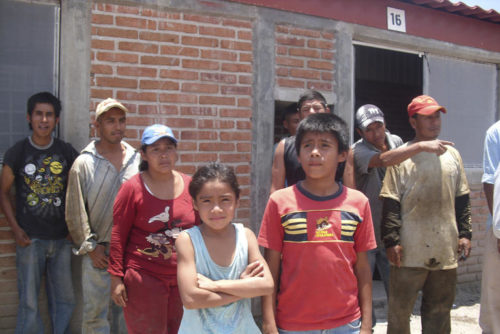In 2015, the Los Angeles Times published a searing exposé on the grinding poverty and rampant human rights abuses faced by workers in the Mexican tomato industry. Over the last decade, Mexican farm exports to the U.S. have tripled to nearly $8 billion dollars in response to the insatiable demand for cheap produce by supermarket and fast-food mega-brands. While low-cost Mexican produce has allowed value to flow up the supply chain, the immense downward pressure on prices exerted by high-volume buyers has contributed significantly to a growing human rights disaster for the tens of thousands of largely indigenous farmworkers who toil at the base of the industry.

Two hundred seventy-five people were freed in the government raid on Bioparques 4. “They were totally captive, prisoners,” a Mexican labor official said. Photo: LA Times.
The labor practices documented by the Times over the course of its 18-month investigation are horrific. Workers, many of whom are underage, are recruited and bused hundreds of miles from home, often living in squalid, overcrowded, and rat-infested camps. They are required to work six days a week for $8 to $12 dollars per day. In many cases, wages are withheld, false debts are incurred at the company store, and workers are prevented from leaving by violent camp supervisors, armed guards and barbed wire fences.
At one such operation, the Bioparques de Occidente mega-farm in Jalisco, three workers managed to escape captivity in 2013. They reported the abuses to Mexican authorities, who subsequently staged a raid at the camp and freed 275 workers from “forced labor,” as described by the regional prosecutor. Bioparques sold its tomatoes under the Kaliroy brand to Walmart, Safeway, Albertsons, and others. Remarkably, Bioparques had been honored as a “socially responsible company” by the nonprofit Mexican Center for Philanthropy in 2009 and 2010. The legal case has now stalled in Mexico’s judicial system.
As a baseline practice, Mexican growers utilize state-of-the-art horticultural techniques and adhere to rigorous food safety and quality standards to meet the exacting demands of their U.S. end-buyers. As the Times aptly noted, “The contrast between the treatment of produce and of people is stark.” The reporters conclude that these same major U.S. brands have done little to enforce social responsibility guidelines, neglecting to strictly condition purchases on compliance with fundamental human rights standards as they have with food safety and quality requirements. The Times notes:
The [U.S.] companies say they are also committed to workers’ well-being and cite their ethical sourcing guidelines. Retailers increasingly promote the idea that the food they sell not only is tasty and healthful but was produced without exploiting workers. But at many big corporations, enforcement of those standards is weak to nonexistent, and often relies on Mexican growers to monitor themselves, The Times found.
The results are the predictable consequences of an approach to social responsibility that is unilaterally defined by corporations, monitored without meaningful worker participation, if monitored at all, and entirely voluntary in its implementation and enforcement. For example, Safeway’s vendor code of conduct, which states that suppliers must offer a “safe and healthy work environment” also promulgates that vendors are expected to “self-monitor compliance.” The case study of Mexican export agriculture is yet one more data point supporting the conclusion that corporate social responsibility cannot effectively address, much less prevent, labor abuse in supply chains.
On a final note, labor conditions in Mexican agriculture stand in sharp contrast with those in Florida under the Fair Food Program (FFP). Yet fast-food giant Wendy’s not only refuses to join the FFP, in contrast to its major competitors, but has abandoned its Florida tomato suppliers altogether in favor of Mexico. In response to mounting concerns from consumers and labor experts about human rights violations in its Mexican produce supply chain, Wendy’s has cited the strength of its own corporate social responsibility approach. Unfortunately, two decades of global experience, including very recent lessons from Mexico itself, indicate that this approach will ultimately end in failure.